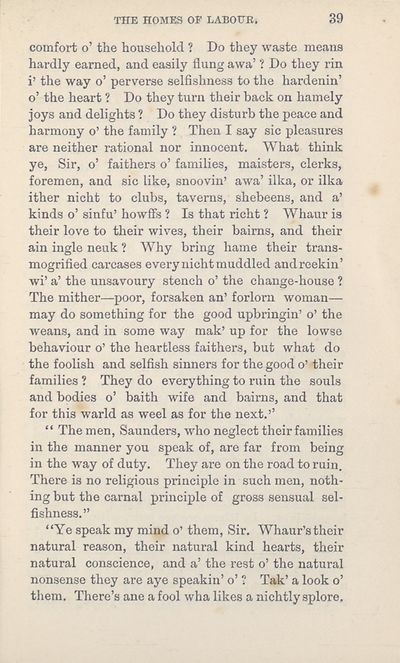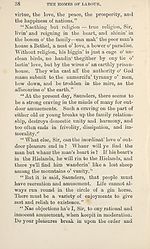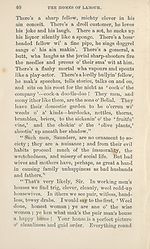Download files
Complete book:
Individual page:
Thumbnail gallery: Grid view | List view

THE HOMES OP LABOUR,
comfort o’ the household ? Do they waste means
hardly earned, and easily flung awa’ ? Do they rin
i’ the way o’ perverse selfishness to the hardenin’
o’ the heart ? Do they turn their back on hamely
joys and delights ? Do they disturb the peace and
harmony o’ the family ? Then I say sic pleasures
are neither rational nor innocent. What think
ye. Sir, o’ faithers o’ families, maisters, clerks,
foremen, and sic like, snoovin’ awa’ ilka, or ilka
ither nicht to clubs, taverns, shebeens, and a’
kinds o’ sinfu’ howfifs ? Is that richt ? Whaur is
their love to their wives, their bairns, and their
ain ingle neuk ? Why bring hame their trans¬
mogrified carcases every nicht muddled andreekin’
wi’ a’ the unsavoury stench o’ the change-house ?
The mither—poor, forsaken an’ forlorn woman—
may do something for the good upbringin’ o’ the
weans, and in some way mak’ up for the lowse
behaviour o’ the heartless faithers, but what do
the foolish and selfish sinners for the good o’ "their
families ? They do everything to ruin the souls
and bodies o’ baith wife and bairns, and that
for this warld as weel as for the next.’’
“ The men, Saunders, who neglect their families
in the manner you speak of, are far from being
in the way of duty. They are on the road to ruin.
There is no religious principle in such men, noth¬
ing but the carnal principle of gross sensual sel¬
fishness.”
“Ye speak my mind o’ them, Sir. Whaur’stheir
natural reason, their natural kind hearts, their
natural conscience, and a’ the rest o’ the natural
nonsense they are aye speakin’ o’ ? Tak’ a look o’
them. There’s ane a fool wha likes a nichtly splore.
comfort o’ the household ? Do they waste means
hardly earned, and easily flung awa’ ? Do they rin
i’ the way o’ perverse selfishness to the hardenin’
o’ the heart ? Do they turn their back on hamely
joys and delights ? Do they disturb the peace and
harmony o’ the family ? Then I say sic pleasures
are neither rational nor innocent. What think
ye. Sir, o’ faithers o’ families, maisters, clerks,
foremen, and sic like, snoovin’ awa’ ilka, or ilka
ither nicht to clubs, taverns, shebeens, and a’
kinds o’ sinfu’ howfifs ? Is that richt ? Whaur is
their love to their wives, their bairns, and their
ain ingle neuk ? Why bring hame their trans¬
mogrified carcases every nicht muddled andreekin’
wi’ a’ the unsavoury stench o’ the change-house ?
The mither—poor, forsaken an’ forlorn woman—
may do something for the good upbringin’ o’ the
weans, and in some way mak’ up for the lowse
behaviour o’ the heartless faithers, but what do
the foolish and selfish sinners for the good o’ "their
families ? They do everything to ruin the souls
and bodies o’ baith wife and bairns, and that
for this warld as weel as for the next.’’
“ The men, Saunders, who neglect their families
in the manner you speak of, are far from being
in the way of duty. They are on the road to ruin.
There is no religious principle in such men, noth¬
ing but the carnal principle of gross sensual sel¬
fishness.”
“Ye speak my mind o’ them, Sir. Whaur’stheir
natural reason, their natural kind hearts, their
natural conscience, and a’ the rest o’ the natural
nonsense they are aye speakin’ o’ ? Tak’ a look o’
them. There’s ane a fool wha likes a nichtly splore.
Set display mode to:
![]() Universal Viewer |
Universal Viewer | ![]() Mirador |
Large image | Transcription
Mirador |
Large image | Transcription
| Antiquarian books of Scotland > Scotland/Scots > Licht frae the smiddy o' Saunders Dinwuddie > (49) |
|---|
| Permanent URL | https://digital.nls.uk/131703288 |
|---|
| Description | Thousands of printed books from the Antiquarian Books of Scotland collection which dates from 1641 to the 1980s. The collection consists of 14,800 books which were published in Scotland or have a Scottish connection, e.g. through the author, printer or owner. Subjects covered include sport, education, diseases, adventure, occupations, Jacobites, politics and religion. Among the 29 languages represented are English, Gaelic, Italian, French, Russian and Swedish. |
|---|

